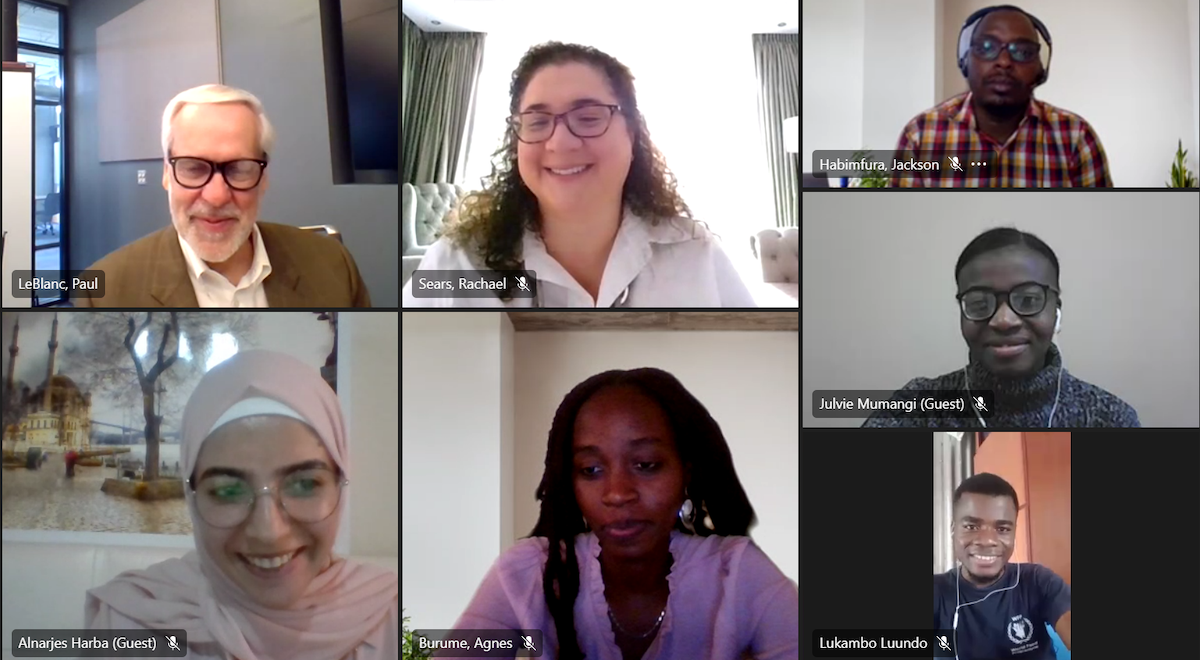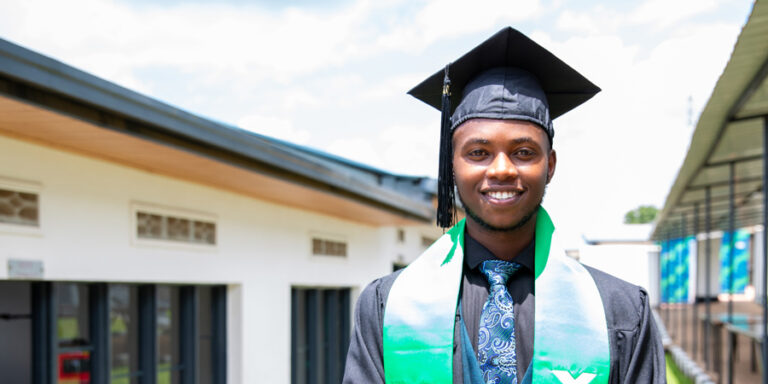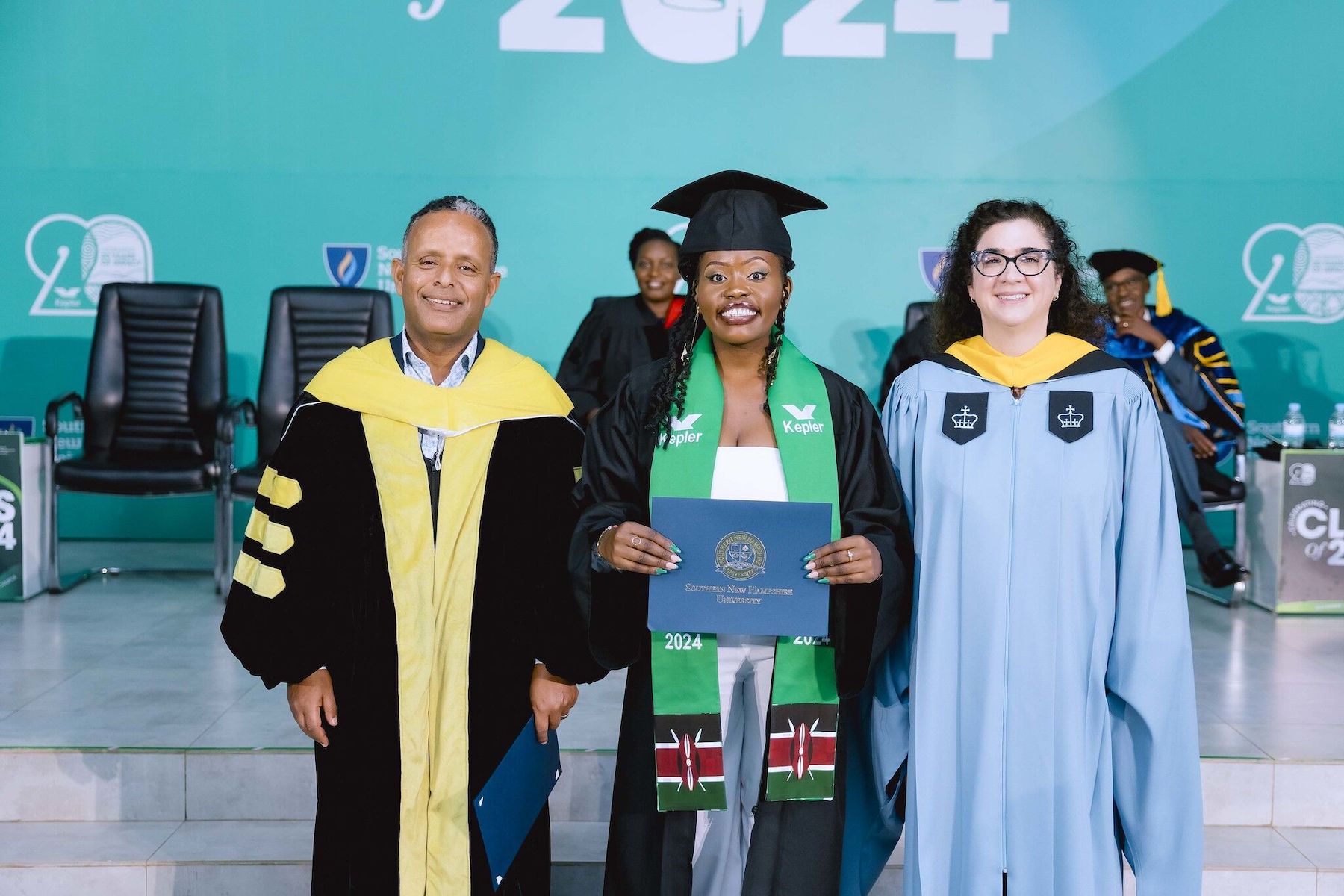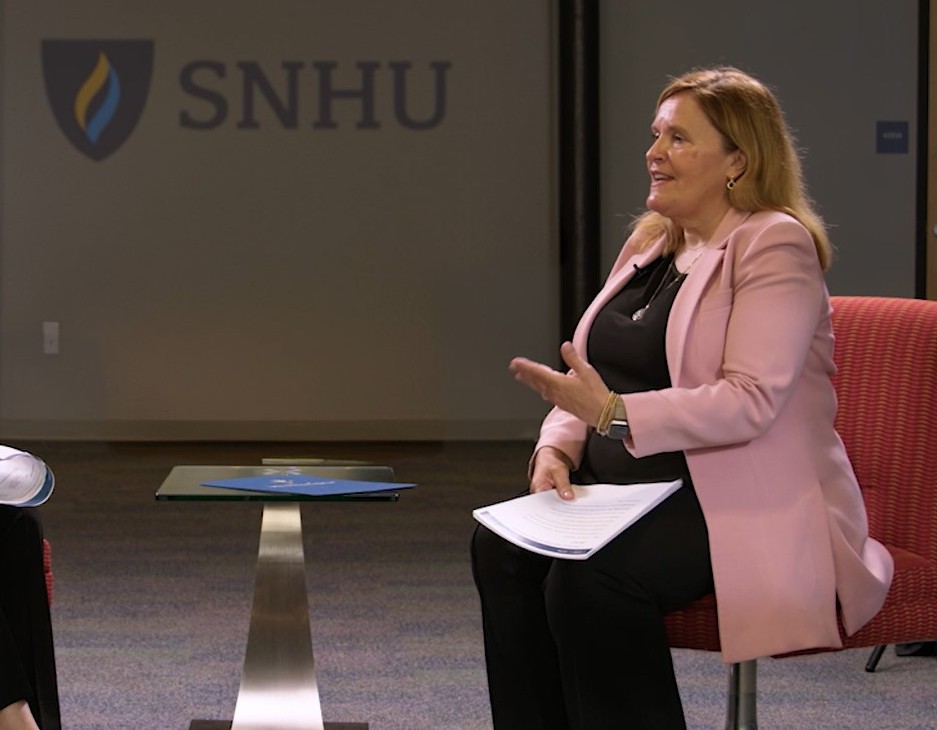Agnes, Jackson, Alnarjes, Glory, and Julvie joined SNHU President Paul LeBlanc to discuss their experiences as refugee learners.
Each year, Southern New Hampshire University’s Global Education Movement (SNHU GEM) honors our remarkable students on World Refugee Day. This year, SNHU President Paul LeBlanc hosted a roundtable with five SNHU GEM students and alumni from around the world, who shared their personal experiences navigating higher education as refugee learners and the impact they’re making in their communities. Our discussion at this event was a reminder that while talent abounds in refugee communities, opportunity does not.
SNHU GEM student Agnes Burume explained it this way: “Being a refugee is not in our blood. It’s a status, and that status can be changed by opening the door and giving us the right to move, the right to work, even the right to education. We too can become successful in whatever nation we find ourselves in.”
To kick off the discussion, Paul LeBlanc noted that there are many prominent misconceptions about refugee status. “People think of it as a transitional state, but the average length of time for refugee status is 21 years,” he said, before asking the panelists to share their own reflections on what people should understand about refugees.
SNHU GEM’s World Refugee Day roundtable took place on Thursday, June 23. Watch the recording.
Many of the students spoke about the challenges that refugees face when seeking work and educational opportunities in their host countries. “People think that refugees only need humanitarian aid, and this leads to the perception that refugees are weak,” said Glory Luundo. “They do not think that refugees can work or contribute.”
“Anyone can become a refugee,” pointed out Jackson Habimfura. “If we are treated fairly and supported, refugees can contribute to the development of their country.”
Alnarjes Harba agreed. “They don’t think about opportunity or access to education as things that refugees can benefit from,” she said. The panelists all agreed that allowing refugees to work and move freely in their host countries – both of which are often heavily restricted – is critical.
The students emphasized the importance of education to improve refugee experiences and allow them to become self-sustaining. “Education is the key,” said Agnes. Julvie Mumangi shared her experience of applying to local universities and jobs in Cape Town and being denied again and again due to her refugee status. “After I finished high school, it became so difficult to achieve my dreams. This program has lifted and pushed me to go so much further. SNHU GEM was a guiding light.”
“It is exciting to see GEM students speaking up to direct and redirect the narrative around refugees,” said SNHU GEM Executive Director Rachael Sears.
Meet the five SNHU GEM panelists:
 Agnes Burume is a Congolese refugee and SNHU GEM graduate. After fleeing from the Democratic Republic of Congo to Rwanda with her family, she was determined to continue her education. Through Kepler Kiziba’s partnership with SNHU GEM, Agnes completed her bachelor’s degree in management with a concentration in logistics and operations in 2019. Her dedication to refugee education led her to a full-time position with SNHU GEM as a Project Manager, planning and managing special projects and coordinating with SNHU GEM’s on-the-ground partner organizations.
Agnes Burume is a Congolese refugee and SNHU GEM graduate. After fleeing from the Democratic Republic of Congo to Rwanda with her family, she was determined to continue her education. Through Kepler Kiziba’s partnership with SNHU GEM, Agnes completed her bachelor’s degree in management with a concentration in logistics and operations in 2019. Her dedication to refugee education led her to a full-time position with SNHU GEM as a Project Manager, planning and managing special projects and coordinating with SNHU GEM’s on-the-ground partner organizations.
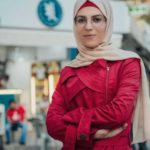 Alnarjes Harba is a Syrian refugee and the first Middle Eastern graduate from SNHU GEM. After escaping the war in Syria at the age of 12, Alnarjes continued her studies in Lebanon and graduated from high school. She was eager to continue her education, but her refugee status prevented her from attending Lebanese universities. SNHU GEM and the Lebanese Association for Scientific Research provided Alnarjes with a path forward. Alnarjes graduated in 2021 from SNHU GEM in Lebanon. After interning with several international organizations, she accepted a position with SNHU GEM as a Student Engagement and Gender Specialist Associate. Currently, Alnarjes is pursuing her dream of attending medical school.
Alnarjes Harba is a Syrian refugee and the first Middle Eastern graduate from SNHU GEM. After escaping the war in Syria at the age of 12, Alnarjes continued her studies in Lebanon and graduated from high school. She was eager to continue her education, but her refugee status prevented her from attending Lebanese universities. SNHU GEM and the Lebanese Association for Scientific Research provided Alnarjes with a path forward. Alnarjes graduated in 2021 from SNHU GEM in Lebanon. After interning with several international organizations, she accepted a position with SNHU GEM as a Student Engagement and Gender Specialist Associate. Currently, Alnarjes is pursuing her dream of attending medical school.
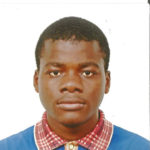 Glory (Lukambo) Luundo is a student at SNHU GEM and a Congolese refugee living in Kakuma Refugee Camp in Kenya. Glory fled the Democratic Republic of the Congo in 2016 after completing high school in the DRC. While living in Kakuma camp, he started the internationally-recognized, award-winning Fishing in the Desert Project to fight malnutrition and hunger in the camp. The Fishing in the Desert team won the United Nations World Food Programme’s first NextGen East African Innovators Programme in 2021. Glory is currently pursuing a bachelor’s degree in healthcare management with a concentration in global perspectives.
Glory (Lukambo) Luundo is a student at SNHU GEM and a Congolese refugee living in Kakuma Refugee Camp in Kenya. Glory fled the Democratic Republic of the Congo in 2016 after completing high school in the DRC. While living in Kakuma camp, he started the internationally-recognized, award-winning Fishing in the Desert Project to fight malnutrition and hunger in the camp. The Fishing in the Desert team won the United Nations World Food Programme’s first NextGen East African Innovators Programme in 2021. Glory is currently pursuing a bachelor’s degree in healthcare management with a concentration in global perspectives.
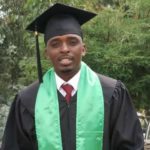 Jackson Habimfura is an SNHU GEM graduate from the Democratic Republic of the Congo. While living in Kiziba Refugee Camp in Rwanda, Jackson found a pathway to higher education and a career in technology through Kepler Kiziba’s partnership with SNHU GEM. In 2018, he graduated with a bachelor’s degree in management with a concentration in logistics and operations. Jackson believes that social entrepreneurship and technology offer creative solutions to the problems that refugees face everyday. He ran a program called Urwego in Kiziba Refugee Camp that equipped refugees with programming skills, and now works full-time as a contractor for the SNHU Technology Help Desk in Rwanda.
Jackson Habimfura is an SNHU GEM graduate from the Democratic Republic of the Congo. While living in Kiziba Refugee Camp in Rwanda, Jackson found a pathway to higher education and a career in technology through Kepler Kiziba’s partnership with SNHU GEM. In 2018, he graduated with a bachelor’s degree in management with a concentration in logistics and operations. Jackson believes that social entrepreneurship and technology offer creative solutions to the problems that refugees face everyday. He ran a program called Urwego in Kiziba Refugee Camp that equipped refugees with programming skills, and now works full-time as a contractor for the SNHU Technology Help Desk in Rwanda.
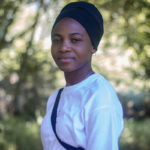 Julvie Mumangi is an SNHU GEM student and Congolese refugee now living in Cape Town, South Africa. Accompanied by her younger sister, Julvie left the Democratic Republic of the Congo at age 7 to join her parents in South Africa. Julvie’s refugee status prevented her from attending local universities in South Africa but she was not discouraged. In 2020, Julvie enrolled at SNHU GEM in South Africa to pursue her bachelor’s degree in healthcare management. While a student, she also volunteered her time as a professional development coach for refugees and South Africans at Scalabrini Centre in Cape Town. Julvie hopes to finish her bachelor’s and pursue a master’s degree in public health.
Julvie Mumangi is an SNHU GEM student and Congolese refugee now living in Cape Town, South Africa. Accompanied by her younger sister, Julvie left the Democratic Republic of the Congo at age 7 to join her parents in South Africa. Julvie’s refugee status prevented her from attending local universities in South Africa but she was not discouraged. In 2020, Julvie enrolled at SNHU GEM in South Africa to pursue her bachelor’s degree in healthcare management. While a student, she also volunteered her time as a professional development coach for refugees and South Africans at Scalabrini Centre in Cape Town. Julvie hopes to finish her bachelor’s and pursue a master’s degree in public health.
